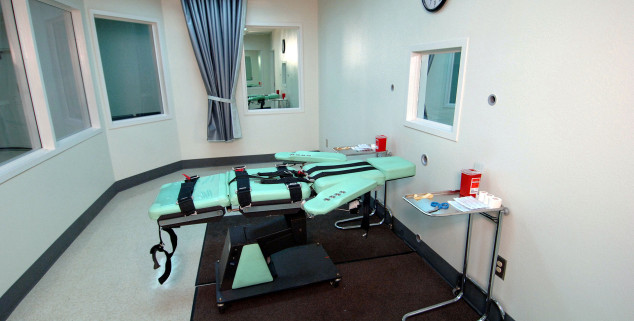News
Support for death penalty at 50-year low
 Gurney used for lethal injections, San Quentin Prison. (Photo: Department of Corrections)
Gurney used for lethal injections, San Quentin Prison. (Photo: Department of Corrections)Support for the death penalty as a punishment for serious crimes in California is now at its lowest point in nearly fifty years. The latest Field Poll finds 56% of voters in favor of keeping the death penalty and 34% opposed. The 56% supporting continuation of the state’s capital punishment laws is down from 69% in 2011. Throughout the 1980’s and early 1990’s eight in ten California voters favored keeping the death penalty.
The current survey also finds voters more divided when asked about a federal judge’s ruling that the state’s implementation of the death penalty is unconstitutional due to the length of time it takes to carry out an execution. In light of the ruling, voters were asked whether the state should work to speed up the execution process or do away with the death penalty and replace it with the penalty of life in prison without the possibility of parole. Statewide, 52% support speeding up the process, while 40% favor replacing the death penalty with life in prison without the possibility of parole.
The results show Californians are divided on the matter, with 52% favoring a speed up in the execution process and 40% supporting replacing it with life in prison without the possibility of parole.
These are the findings from the latest Field Poll, conducted by telephone among 1,280 registered voters in California in six languages and dialects. The complete survey and a description of its methodology can be seen at www.field.com.
The Field Poll has been tracking California public opinion about the death penalty for over fifty years. The current survey finds 56% of registered voters in favor of keeping the death penalty as a punishment for serious crimes. The last time The Field Poll found public support for the death penalty in California dipping below 60% was 1971, when 58% favored it and 34% wanted to do away with it. Support for the death penalty reached a high point in the mid-1980’s and early 1990’s when 80% or more favored it. By contrast, the all-time low in California voter support for keeping the death penalty was in 1956 when just 49% favored it.
Federal district judge Cormac J. Carney recently ruled that the state’s prolonged delays in administering the death penalty render it unconstitutional because of the Eighth Amendment’s ban on cruel and unusual punishment. In his ruling Carney said, “For all practical purposes then a sentence of death in California is a sentence of life imprisonment with the remote possibility of death – a sentence no rational legislature or jury could ever impose . . (It) has resulted in a system in which arbitrary factors, rather than legitimate ones, like the nature of the crime or the date of the death sentence, determine whether an individual will actually be executed. And, it has resulted in a system that services no penological purpose. Such a system is unconstitutional.”
In light of this ruling, voters in this survey were asked whether the state should work to speed up the execution process or do away with the death penalty entirely and replace it with the penalty of life in prison without the possibility of parole.
The results show Californians are divided on the matter, with 52% favoring a speed up in the execution process and 40% supporting replacing it with life in prison without the possibility of parole. Another 8% had no opinion.
Republicans, conservatives, Protestants, and Central Valley voters are the strongest supporters of the death penalty, and large majorities also favor speeding up the execution process rather than doing away with the death penalty to comply with the judge’s ruling.
Democrats, liberals, voters under age 30, African Americans, residents of the San Francisco Bay Area, those with a post graduate education, and voters either affiliated with a non-Christian religion or having no religious preference are the most likely subgroups to favor replacing the death penalty with life in prison without the possibility of parole to comply with the judge’s ruling.
—
Ed’s Note: The findings in this report are based on a Field Poll completed August 14-28, 2014 among 1,280 California registered voters. The maximum sampling error for results from the overall sample in this survey is +/- 3.2 percentage points at the 95% confidence level.
Want to see more stories like this? Sign up for The Roundup, the free daily newsletter about California politics from the editors of Capitol Weekly. Stay up to date on the news you need to know.
Sign up below, then look for a confirmation email in your inbox.

Leave a Reply